When people hear the term fundraiser, they think of someone approaching them on the street, asking for a donation. Or someone who starts a crowdfunding campaign online.
That’s certainly a part of fundraising. But that’s not all.
Fundraising is a viable field to build a career in, with great advancement opportunities. The catch? You need to have the right interests and skills.
A survey of UK charities revealed that the fundraising-related roles were, in fact, the hardest to fill:
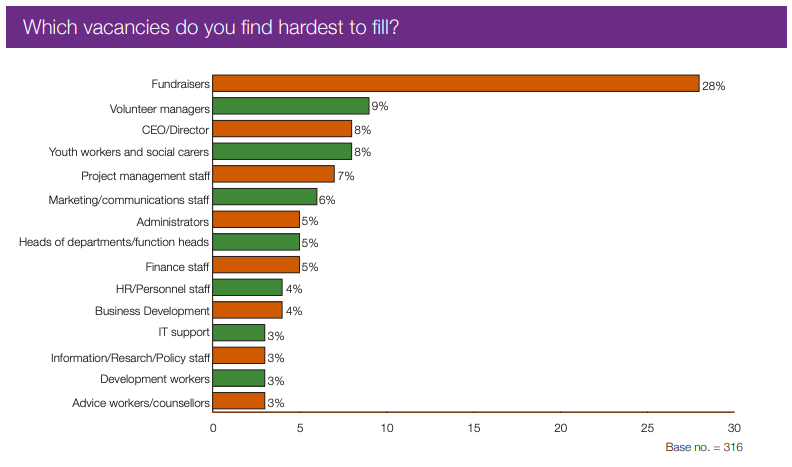
Cited among the most common reasons for these staffing difficulties were:
- Lack of the necessary skills from applicants
- Lack of experience among applicants
- Lack of applicants
The findings above all but indicate that individuals with the right skills (and experience for non-entry-level positions) won’t have trouble finding jobs as a fundraiser.
This post shall outline the basic skill sets you will need for various fundraising roles and fit into your nonprofit job.
- What does a fundraiser do?
- Why do people get into fundraising?
- What kind of career can a fundraiser expect to have?
- Key traits of fundraisers
- Fundraising soft skills
- Fundraising technical skills or hard skills
- Transferable fundraising skills
- Fundraising skills specific to your role
- Ways to develop fundraising skills
What does a fundraiser do?
You probably already have a basic idea of what a fundraiser does:
The primary objective of any fundraiser is to raise funds for their organization.
A fundraising professional uses a mix of research, marketing and sales skills to achieve that goal. How a fundraiser goes about raising funds varies from role to role, we’ll get into further on.
Why do people get into fundraising?
For many people, fundraising as a profession allows them to help causes they care about.
Not only do they create awareness and bring attention to the cause, but they also raise money for them.
This is evident from a study by CharityJob:
76% are said to be searching for jobs based on the cause an organization supports first, before salary/location
What kind of career can a fundraiser expect to have?
Asking for money and organizing fundraising events is not the only role of a fundraiser.
There are plenty of paths and specializations a career in fundraising could lead to. For example, a role as a major gift officer could see you in charge of communication with donors. You would handle all face-to-face meetings and phone calls with them, and encourage them to further invest in your cause
Clearly, such a role needs good interpersonal skills and an attitude to match.
Not sure you have the skillset for that role? Well, here’s a (not so) secret fact: Not all fundraising requires you to talk directly to donors.
A grant writer creates and submits grant proposals to foundations and government organizations to raise money.
A Development Director, who oversees the organization’s overall funding, has a more administrative role than a donor-centric role.
He sets annual fundraising goals, directs the staff, plans events and manages the donor database – so that it is easier for field fundraisers to make the ask.
Some of these roles and the skills associated with them are discussed below.
Key traits of fundraisers
What’s the difference between traits and skills?
Traits are the qualities that are intrinsic to a person’s character and are often constant throughout their lives.
Some people may be predisposed towards a career in fundraising if they are passionate (and compassionate) individuals. They want to take active steps towards bettering a cause and they don’t mind working in a team.
More importantly, they don’t mind asking for money.
For fundraisers, the key personality traits are:
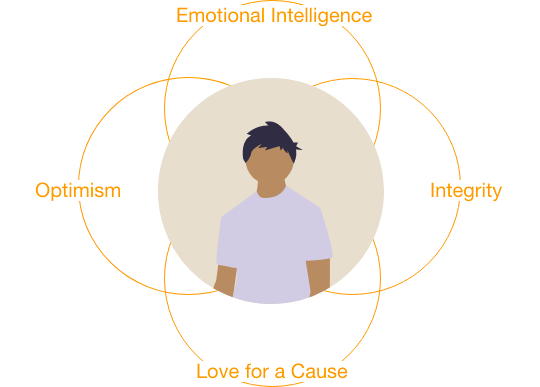
Emotional Intelligence
Having a grasp on how your donors feel and being diplomatic while communicating with them is a key trait of fundraising.
Integrity
The integrity of an individual fundraiser is often taken as the integrity of an organization as a whole. That means if a donor can trust you, they will more than likely be willing to donate to your cause. Donors, fellow fundraisers, and board members will respect and even be inspired by fundraisers with a strong moral code.
Optimism
A fundraiser who directly interacts with supporters can expect to hear multiple no’s over the course of the day. It’s tough, but a naturally optimistic person will know that the next big donation is just around the corner.
Most importantly – They love making a difference:
Enthusiasm is infectious, and a fundraisers enthusiasm for the cause they are working for will be immediately noticeable to potential donors.
If you have these character traits, a job as a fundraiser might be the right one for you.
In addition to these traits, there are skills that you can develop to be more effective in a fundraising role.
We can classify these skills into:
- Soft skills
- Hard skills
- Transferable skills
Fundraising soft skills
What are soft skills?
Building good relationships with donors and colleagues is paramount for a fundraiser.
That’s where your soft skills come into play:
Soft skills are interpersonal skills that let you interact with people. For a fundraiser that means donors and fellow fundraisers.
Research conducted by Harvard University, the Carnegie Foundation and Stanford Research Center concludes that 85% of job success comes from having well-developed soft and people skills, and only 15% of job success comes from technical skills and knowledge (hard skills)
Here’s how much soft skills matter to a company when hiring a new employee:
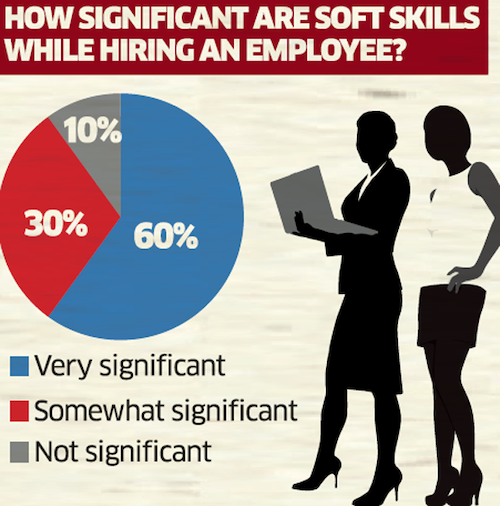
Good soft skills will help you stay aware of how your interactions with donors influence their giving and tune into ways you can raise more money for you cause
Like all skills, you can better at soft skills with practice and real-life experience.
Communication
If there is a skill that can encapsulate all soft skills, it’s this one.
A good communicator will be able to engage an audience through any medium, be it spoken or the written word.
The next big thing in fundraising is thinking about how we make our donors feel when we communicate with them. The goal is not money: the goal is being respectful and developing relationships. Money follows.
Prof. Adrian Sargeant
Not only will a fundraiser with good communication skills be able to better engage donors, they will also be able to better work with their colleagues to reach fundraising goals.
Negotiation
In fundraising, a lot of negotiations comes down to understanding your donors and their limitations. A good negotiator is able to:
- Listen first, in order to understand how much the potential donor will be willing to give before:
- Make the right ask. In case they are on the fence, and need a bit more convincing, you will need to:
- Be persistent, but not forceful, so you don’t burn any bridges with your donors.
Social awareness
You might have heard this one:
Only 7% of communication is verbal – 55% is your body language and eye contact.
If you are too self-conscious you won’t be able to pick up on the cues your potential donors are sending while you are talking to them. Are they showing interest in your cause? Does it look like they are excited to contribute?
Thankfully, confidence can often be built up with experience. In time you will be able to shift awareness from your self to your donors.
Perseverance
Being a fundraiser is tough work. After a full day of hearing only ‘nos’ from every prospect, you still have to talk to more donors to cultivate them.
Yes, it’s all well and good to be optimistic here. But what will truly see you through this is perseverance.
Building long term relationships with donors needs you to take the initiative, by frequently reminding them that they play an important role by supporting your cause.
Etiquette
As a fundraiser, you will be expected to interact directly with your donors. For major gift fundraisers, this applies even more so.
How you present yourself when you interact with them might make or break a donor relationship.
What may be normal around your friends and your colleagues may not be a good idea around your donor. So be sure to shave that 3 day stubble and store your ostentatious hoop earrings before going into a donor meeting.
That doesn’t mean you need to greet every donor in a suit and tie. Package your presentation to meet the interests of your donors. If their style is casual, then you might as well consider dressing more comfortably too.
Creativity
There are times as a fundraiser where you will be required to think on your feet.
Maybe a campaign isn’t going as smoothly as you would like, despite planning ahead. Or a major donor is getting less involved with your organization. What if it’s a new situation and you don’t have a plan to tackle it?
A creative fundraiser will be able to come up with interesting solutions, effectively communicate them to their colleagues and keep their donors engaged.
Related reading: Use These 52 Proven Fundraising Ideas to Raise More Funds This Year
Fundraising technical skills or hard skills
What are hard skills?
The specific knowledge you need to execute your job as a fundraiser can be classified under hard skills. That includes knowledge of the fundraising space and fundraising software.
According to The FSI skills survey 2016-2017, the skill areas with the highest skill gaps for charities were hard skills like IT know-how:
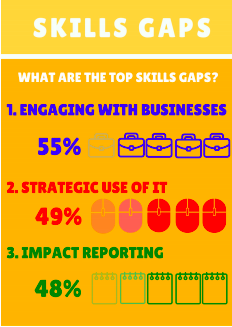
Language skills
Language skills are universally useful. They come in extra handy as a fundraiser if you are working for a cause that wants to appeal to a language-specific demographics.
Language skills let you:
- Communicate with people in their own language in face-to-face conversations.
- Translate your written communications with donors to other languages.
By communicating with people in their own language, you will be able to give them a more personalized experience and better the chances of them donating.
Writing Skills
The ability to spread your message to supporters and people outside of your main supporter base and inspire them to donate to your cause is a large part of fundraising.
You can’t talk to all of them personally, which is why communication via writing is important for any fundraiser. Writing skills will come in handy whenever you are
- Writing an email or a letter thanking donors for a contribution.
- Creating a social media update to engage your followers and spread information about a new initiative.
- Drafting a grant proposal to win funding from a foundation.
Grant writing is a specialized skill and a major part of fundraising for nonprofits. An experienced grant writer is able to write effective grants through a fair bit of research and on strict deadlines.
IT skills
Basic software skills have become a requirement for most professions. If you know your way around a word processor, PowerPoint and an Excel sheet, that will be enough to get your foot in the door.
For managerial positions, you will need a working knowledge of current fundraising software systems.
Small mistakes with big ramifications, like calling someone who asked to be removed from your list, are easily avoided when you know what you are doing with the software your nonprofit uses.
Experience in the Digital Space
According to The Charity Digital Skills Report 2018:
“Charities are looking for digital leadership. 77% want their senior team to offer a clear vision of digital and what it could help them to achieve”
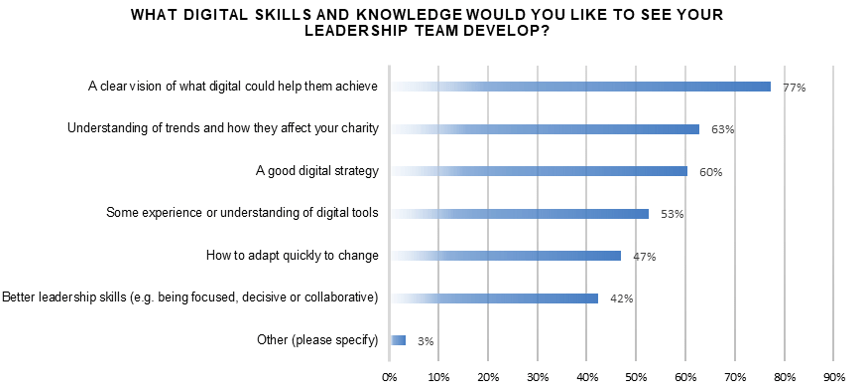
For leadership positions, you will be expected to find new ways to use technology to fundraise and develop a digital strategy for your organization.
For example, a strategy to engage donors through multiple channels, effectively using social media for storytelling or coming up with ideas for a simple, easy to use online donation page.
Knowledge of the Fundraising space
You will need to work in accordance to the fundraising regulations and the data protection legislation of the country your nonprofit is operating in.
That means you will need at least a basic working knowledge of those regulations.
By working outside these regulations, for example continuing to contact a donor after they opt-out, you would stand to lose trust in the eyes of your donors.
Transferable fundraising skills
What is a transferable skill?
As the term suggests, transferable skills find use across jobs and industries.
A lot of the ways the corporate sector does marketing and manages customer relations can be applied to nonprofit fundraising.
If you are crossing into fundraising from a different domain, you may have already developed some transferable skills. Here are a few that are particularly relevant to fundraising:
Problem solving
The ability to deconstruct a problem, identify a viable solution, and apply the solution with the resources you have available is the essence of problem solving.
As a fundraiser, limited resources, whether it be in terms of staff or funding will be a common issue.
Some probable examples would be: You don’t have enough volunteers for an event, or you don’t have the time to call and thank donors. As a fundraiser, what will you do to ensure that donor experience doesn’t suffer?
This is just an example of the kind of problems you have to address as a fundraiser. You will need to make the best use of the resources available to you to solve problems that crop up during your fundraising campaigns.
Collaboration
Team-work is the ability to work together in pursuit of a common goal. For a fundraising team, that might mean working together on a complex grant proposal or a large fundraising event.
This useful book by nonprofit leader Mim Carlson, Team-Based Fundraising Step by Step, talks about taking team-work in fundraising from an informal process to a strategic one, by identifying and putting to use the skills of individual team members.
Administrative skills
For any non-entry-level role in fundraising, you need to have a grasp on skills like organizing, planning, scheduling, and staffing. You may also need to establish processes for your team to follow to achieve your fundraising goals.
Data analysis
Fundraising is a numbers game. Fundraisers use donor data and analytics to guide their decision-making every day. Fundraising directors use data to create fundraising strategies for their organization.
What is your donors’ relationship with your organization? Are you making use of your donor data to its highest potential? What else can you do to engage your donors and raise funds?
The ability to analyze the data your organization has will help you answer those questions.
Leadership
Leadership is a much-needed skill for an experienced fundraiser. Rallying your troops is hard, especially when you are leading a diversified fundraising team, where some people may be dealing with grant writing and others might be working in event fundraising. Which is why experience in both leadership and fundraising is a must for a higher-level role.
A good leader will be able to inspire their fundraisers to constantly go above and beyond while doing their jobs.
Fundraising skills specific to your role
In your career as a fundraiser, you will be forced to adapt to new responsibilities as you move from entry-level to more managerial positions. That means learning hard skills like strategizing, planning and organizing fundraising campaigns.
But even at the highest level, you will still be interacting with donors. Which is why your communication soft skills will stay relevant.
The terminology for these roles often varies between organizations.
Fundraising Officer skills
The fundraising coordinator or fundraising officer is what you would think of as a traditional fundraising role. That is, they directly solicit donations.
This role will commonly report to the fundraising manager.
The role of a fundraising officer
The responsibilities for this role vary greatly based on the organization and where their donations come from. But good communication skills are a common requirement for all roles of a fundraiser.
Here are the most common types of fundraising officer roles:
Major gifts fundraiser skills
Related: Major Gift Fundraising: 9 Best Practices You Can Implement Today
As a major gifts officer you can expect to interact directly with your organization’s major donors.

| Responsibilities | Skills you will need |
| You will undertake all activities with regards to major donors—from the identification and cultivation to the solicitation and stewardship of major donors. You should be able to work with a team of major gift officers (if in a large organization). | Excellent interpersonal skills. The ability to interact and build a rapport with donors. Flexibility. You will often shift from tasks such as identifying your major donors and creating a plan for soliciting them, to traveling to visit donors. The ability to confidently speak to donors on behalf of your organization. |
Planned-giving fundraiser skills
A planned giving officer is a member of the fundraising team who works to manage and cultivate planned giving.
| Responsibilities | Skills you will need |
| Make personal planned giving asks to high value donors. Work to create a planned giving program for your organization. Create and provide educational materials about planned giving to fellow staff and donors | Much like a major gift officer, you will need to communicate and build a rapport with donors. In order to provide donors with options for planned giving and guiding them through the process, you will need detailed knowledge about the complexities of planned giving, including – estate planning, wills, trusts and tax laws. |
Events fundraiser skills:
A charity event planner does the heavy lifting before a fundraising event. They are responsible for the entire planning as well as making sure everything goes smoothly on the day.
| Responsibilities | Skills you will need |
| Work with multiple vendors and participants in order to make sure that setup for the event is achieved smoothly. Organize and update the guestlist for the event. Plan and execute fundraising strategies during the event. | Multi-tasking. As an event fundraiser, you will have plenty of issues demanding your attention, often within a short period of time. There will be plenty of areas you can and must insert your creativity while organizing an event. |
Capital campaign fundraiser skills
Capital campaign fundraisers most commonly organize to raise money for construction and renovation projects for a nonprofit within a limited time span.
| Responsibilities | Skills you will need |
| Similar to a major gift fundraiser, you will manage visits and solicitations with donors to fund your campaign. Writing and submitting grant proposals. Identify donor prospects at an individual, foundation and corporation level. | The ability to meet deadlines is key for a capital campaign fundraiser. Since a capital campaign often receives funds from all types of donors, such as individuals and corporations, you will need a varied set of skills. Good oral and written communication skills are a must for this role. Strategy and planning skills to execute a campaign strategy. |
Grant fundraiser skills
A grant writer is a member of the nonprofit development team who writes proposals to apply for financial grants from companies, foundations, trusts and government organizations.
| Responsibilities | Skills you will need |
| Identify opportunities for grants. Writing and submitting winning grant proposals. Recording and managing records as hard copies or in a database. | Many grants are open to new applications for only limited periods of time. As a grant writer, you will need to be able to meet strict deadlines. You will need to do a fair bit of research for effective grant writing for which you need a good knowledge of sources for fundraising information. A degree or past experience in professional writing will help you in this role. |
Fundraising Research Analyst Skills
A fundraising research or data analyst is a purely technical role, which means you can expect a lot of spreadsheets and number crunching.
This role is somewhat separate from the fundraising department. You will find yourself working alongside Strategic Operations Executives and reporting to a Strategic Operations Manager.
| Responsibilities | Skills you will need |
| Undertake deep market research to gain an understanding of the market and the nonprofit competitors in your space. This research will drive effective decision-making for your fundraising team. You will work in accordance to data protection and fundraising regulatory requirements of the country your organization is operating in. | The ability to collect and assess a large amount of information quickly and draw conclusions from it. A strong attention to detail. Reading, writing and communication skills. Ability to present your data and conclusions to various seniority levels. |
Fundraising Manager Skills
Fundraising managers are responsible for organizing a fundraising team to meet goals set by a director of development. In a smaller organization, the roles of a fundraising manager and a development director may be the same. In a larger organization, there may be managers for each type of fundraising activity undertaken by the organization.
At least three years of experience in fundraising is expected for this role. Some organizations may consider previous experience in sales or marketing as a substitute.
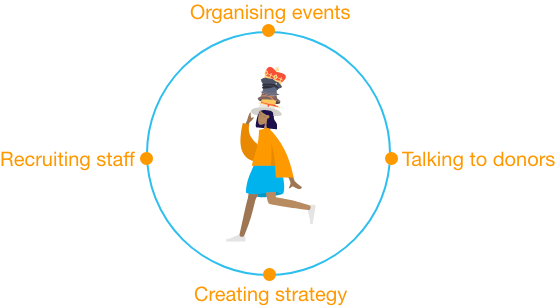
As a fundraising manager will find yourself needing to wear multiple hats:
| Responsibilities | Skills you will need |
| Recruit and organize staff and volunteers. Communicate and build relationships with major donors. Organize fundraising events. Identify grant opportunities Creating and executing fundraising strategy | Strong leadership skills, the ability to inspire your team during crunch situations. Excellent communication skills, both verbal and non-verbal. Good research and strategic thinking skills. The ability to balance a budget and achieve fundraising targets. |
Ways to develop fundraising skills
Volunteering before getting a job as a fundraiser
Like any job, the role of a fundraiser is not for everyone. If you are considering fundraising as a career, it is a good idea to volunteer first (and check if it is really your cup of tea).
Volunteering at a nonprofit is a good way to gain experience and find out whether fundraising is a match for your skills and personality.
It also gives you an opportunity to check out the other dimensions of charity work. As a volunteer, you can start gaining contacts in the sector, which could lead to job opportunities down the line.
Learning on the job – skills gained from fundraising
Not everyone goes into a fundraising career with experience. Volunteering for a role as a door to door fundraiser or a telephone fundraiser can give you the skills necessary to tackle broader fundraising roles.
According to Sam Butler, Acquisitions and Comms Manager at St John Ambulance:
“Street fundraising taught me to be resourceful more than any other job I’ve had. It gave me so much insight in to fundraising in general; including direct marketing and communication. It really stood me in great stead for a broader role, and helped me to quickly gain promotion internally at St John Ambulance.”
Learning fundraising through fundraising skills courses
The great thing about fundraising is that your education or degree doesn’t matter as much as your experience. If you want to go more in-depth into learning about fundraising and what goes into it, these fundraising skills courses can help you out:
If you’re looking for online courses on fundraising, Skillshare and Coursera offer tons of great resources taught by experienced professionals.
Here’s an excellent blog post on different fundraising courses, both online and offline, along with their associated CFRE (Certified Fundraising Executive) points.
Want to learn more about fundraising in general? Our blog has plenty of resources for you to read.
Do some fresh reading on fundraising


